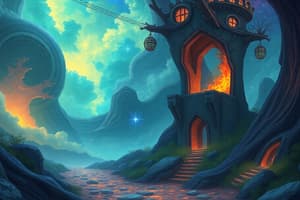Podcast
Questions and Answers
What is the primary characteristic of literature as described in the content?
What is the primary characteristic of literature as described in the content?
- It should always consist of non-fictional elements.
- It is always written for educational purposes.
- It must have permanent value and an imaginative quality. (correct)
- It serves solely to entertain without any deeper meaning.
Which of the following statements accurately describes fiction?
Which of the following statements accurately describes fiction?
- Fiction is based entirely on true events.
- Fiction consistently adheres to factual accuracy.
- Fiction is derived from the imagination of the author. (correct)
- Fiction often includes autobiographical elements.
How does literature benefit readers, according to the content?
How does literature benefit readers, according to the content?
- It eliminates the need for other forms of writing.
- It only serves to provide entertainment.
- It enhances vocabulary and cultural understanding. (correct)
- It requires deep analysis to understand its value.
What distinguishes poetry from prose?
What distinguishes poetry from prose?
Which genre includes novels like 'Harry Potter' and 'Great Expectations'?
Which genre includes novels like 'Harry Potter' and 'Great Expectations'?
In what way can literature make a person wiser?
In what way can literature make a person wiser?
What defines nonfiction literature?
What defines nonfiction literature?
Which of the following statements best reflects the essence of a literary genre?
Which of the following statements best reflects the essence of a literary genre?
Flashcards
What is literature?
What is literature?
Writing that is valued for its artistic merit, typically including novels, plays, and poems.
Define literature (intimate experience)
Define literature (intimate experience)
A personal experience of the author expressed through careful use of structure, imagery, and metaphors.
Define literature (class struggle)
Define literature (class struggle)
A collection of writings that reflect social class struggles.
Define literature (content & form)
Define literature (content & form)
Signup and view all the flashcards
What is a genre in literature?
What is a genre in literature?
Signup and view all the flashcards
What is fiction?
What is fiction?
Signup and view all the flashcards
What is non-fiction?
What is non-fiction?
Signup and view all the flashcards
What is prose?
What is prose?
Signup and view all the flashcards
Study Notes
Introduction to Literature
- Literature reflects significant themes in human experiences, similar to how a mirror reveals aspects of oneself.
- Literature is considered valuable artistic writing, especially novels, plays, and poems. This is according to the Oxford Advanced Learner's English Dictionary.
Defining Literature
- Literature involves a deep, personal articulation from the author through vivid imagery, masterful structure, and evocative metaphors.
- Literature represents societal class struggles, examining the dynamics within communities.
- Literature transcends storytelling to encompass the way a story is told, emphasizing both content and form.
- Key characteristics of all writing include lasting value, exceptional form, imaginative merit, and emotional impact.
Importance of Literature
- Literature enhances language proficiency.
- Literature exposes readers to diverse cultures, life experiences, and historical contexts globally.
- Literature provides insights into regions and societies that may be inaccessible.
- Literature captivates and entertains readers.
- Literature cultivates critical thinking and judgment skills.
- Literature facilitates understanding diverse perspectives and comparisons to personal experiences.
- Literature is instrumental in language development.
Literary Genres
- Genre, derived from the French word for "type" or "kind," categorizes literary works.
- English literature encompasses numerous genres including Drama, Fiction, Non-Fiction, and Poetry.
- Subcategories within fiction include fantasy, folklore, historical, realistic, and others.
- Similarly, Drama includes categories like comedy, tragedy, and tragicomedy.
- Non-fiction covers biographies, auto-biographies, narrative writing, and periodicals.
- Poetry includes lyric and narrative poetry, as well as dramatic poetry.
Fiction vs. Non-Fiction
- Fiction originates from the author's imagination, not real-world events.
- Examples of fiction include plays, poems, short stories, and novels.
- Non-fiction is based on true events or factual information
- Non-fictional examples include journals, magazines, newspapers, and informational books like history.
Prose and Poetry
- Prose and poetry represent two primary writing formats.
- Prose, derived from the Latin word 'prōsa' meaning “straightforward”, is the standard form of written language. Examples: newspapers, novels, and magazines.
- Poetry employs specific arrangements of words to evoke a potent emotional response. Rooted in the Latin "poēta" (poet), poetry uses language for its unique aesthetic qualities that extend beyond its explicit meaning.
Prose vs. Poetry (Differences)
- Prose generally does not utilize rhyme or rhythm, while poetry often incorporates these elements.
- Prose utilizes complete sentences grouped into paragraphs for structure, whereas poetry employs lines within stanzas.
- Prose often employs plain language, while poetry often utilizes more figurative and evocative language.
- Prose is usually comprehensible with one reading, opposed to poetry where multiple readings are sometimes necessary for understanding.
Examples
- William Shakespeare's plays, poems, and sonnets are recognized examples of literature.
Conclusion
- Understanding literature enhances appreciation for diverse cultures and individual human experiences.
Studying That Suits You
Use AI to generate personalized quizzes and flashcards to suit your learning preferences.




